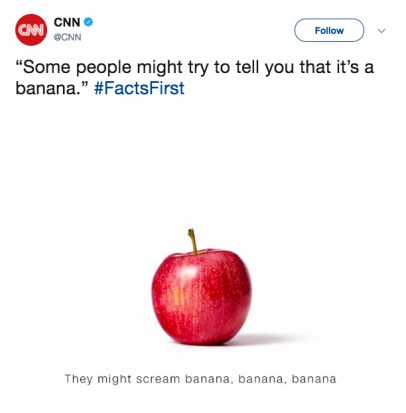Good will come from this most mendacious year
From "Public Relations" by photographer, Garry Winogrand.
2017 was a good year for communication and the people who practice it. Before you throw something at this blog, please give me a few minutes to explain this highly debatable claim.
Yes, lies and liars abound. Yes, technology makes it easier for the devious to deceive. And yes, American leadership seemed allergic to the truth this year right from the start.
Yet, this most mendacious year has and will lead to some good. Already, effective communication and strong communicators are more valued than ever by smart organizations in this era of pervasive reputation risk. Plus, we’ve had a graduate-level course this year in the art of apologizing publicly, the danger of not knowing your audience, and how and how not to use Twitter.
More seriously and importantly, the unrelenting and brazen attacks on rational thinking and the truth in 2017 have raised awareness of how essential integrity in public communication is to a successful democracy.
At this point a good blogger would cite a study from Pew Research to back up this claim. I won’t because studies have demonstrated you probably wouldn’t believe the studies anyway. Instead, I'll simply tell you what I believe is happening as a result of these attacks on the truth and how I hope our profession will mobilize to fight back.
First, my beliefs.
If you care about how public policy affects people, especially those who are vulnerable, I believe you realize it has become more acceptable for people in power to lie to get what they want.
If you care about a free and unfettered press, I believe you realize that the growth in politically motivated attacks on it are unprecedented and dangerous for journalists and for the sustainability of democracy.
If you care about rational, fact-based discourse, I believe you realize that professional phonies and provocateurs are lurking in the dark corners of the Internet with the sole purpose of deceiving you to further their own interests.
If you care about civility, I believe you realize that it is disappearing, replaced by contempt and insults.
Next, my hopes for turning these realizations will turn into action.
I hope CEOs will continue to be active on social and economic policy and human rights. I also hope they will be as publicly visible on difficult reputation issues such as tax reform, trade, and globalization as on values-based issues like immigration and diversity.
I hope the communication and journalism professions will work together on a media literacy campaign to separate real work from propaganda. I hope the technology companies whose platforms are used to spread lies and outrage will continue to help fund this effort. As The Economist wrote recently, “It would be wonderful if such a system helped wisdom and truth rise to the surface.”
I hope the communication profession will continue to lead the way in the fight for integrity in public communications. I am proud to be part of an organization, the Arthur W. Page Society, whose number one principle has long been “Tell the Truth," and the Arthur W. Page Center for Integrity in Public Communication, which is funding academic research on "fake news" and all its implications.
I hope we will be pushed to do more by a new generation of communicators who insist on working for “good” companies that have clearly stated and admirable values and that live by them. And by communication students, who feel the same way but want us to move faster and more aggressively.
I hope more companies will adopt strategies based on public good as well as profit, and that communicators will be at the center of determining the "what" and "how."
I hope you will become part of the difficult work ahead, and help turn 2017's mendacity into 2018's honesty.


